A recent study reveals that 77% of college students prioritize taste over price when purchasing baked goods on campus, highlighting a significant shift in consumer behavior. With nearly two-thirds of students buying baked treats at least once weekly from campus dining venues, universities are facing increased pressure to improve their culinary offerings. The demand for unique desserts and specialty drinks like boba tea is soaring, with 86% of students expressing interest in more diverse options. As Stéphanie Brillouet, Marketing Director at Délifrance, notes, “Students are looking for high-quality, great-tasting baked goods on campus. While price is a factor, taste and freshness are the top priorities.”
The Sweet Tooth of Campus Life
The data couldn’t be clearer: college students are becoming increasingly discerning consumers when it comes to campus dining options. The traditional image of students surviving on instant noodles and cheap pizza is rapidly changing. Today’s college population is willing to spend more on quality food experiences, particularly when it comes to baked goods.
Among these treats, certain classics remain the most sought-after. Cookies lead the pack, followed closely by brownies, muffins, cakes, and donuts. I’ve noticed this trend firsthand when visiting various campus cafes, where freshly baked chocolate chip cookies often sell out within hours of being placed on display.
What’s particularly telling is that 72% of students prefer freshly baked items over pre-packaged alternatives. This preference for freshness signals a broader shift toward quality-conscious consumption. Many students I’ve spoken with mention that they can instantly tell the difference between a freshly baked cranberry orange muffin recipe and something that’s been sitting on a shelf for days.
The frequency of purchases is also notable, with 63% of students buying baked goods at least once weekly. This regular consumption pattern creates significant opportunities for campus dining venues to build loyal customer bases and steady revenue streams.

What Drives Students’ Baked Good Choices?
When deciding which treats to purchase, students consider several key factors. Taste reigns supreme at 77%, followed by freshness (68%), price (59%), convenience (52%), and variety (48%). These statistics from the Délifrance report reveal that while college students are budget-conscious, they won’t sacrifice quality for a few dollars saved.
Price sensitivity hasn’t disappeared entirely, but it’s taken a backseat to taste preferences. Only 23% of students prioritize price over taste when making purchasing decisions. This willingness to pay for quality extends to premium offerings, with 65% of students ready to spend extra on artisanal or specialty baked goods.
Campus dining venues that understand this shifting dynamic have begun adapting their offerings. Some universities have partnered with local bakeries to bring in fresh, high-quality items daily. Others have invested in on-site bakeries where students can watch their treats being made fresh throughout the day, adding an experiential element to the purchase.
Convenience remains important in the hectic college environment. Students appreciate grab-and-go options that don’t compromise on taste, similar to those ready-to-bake cupcake options that combine convenience with a fresh-baked experience. The ideal scenario for many students is finding quality baked goods that can be quickly purchased between classes.
Emerging Trends in Campus Dessert Preferences
Beyond traditional favorites, campus dining venues are witnessing an evolving landscape of student preferences. A striking 86% of students express interest in more unique desserts and specialty drinks on campus. This desire for novelty reflects broader food trends across generational lines, with Gen Z particularly drawn to Instagram-worthy treats and global flavors.
Boba tea and similar specialty beverages have exploded in popularity, often paired with complementary baked goods. This combination creates an experience that students are willing to pay premium prices for, especially when the quality matches their expectations. Many students now look for these specialty items as part of their regular campus routine.
Dietary inclusivity has also become a major consideration. With 58% of students seeking more gluten-free and vegan options, campus dining venues are expanding their offerings to accommodate diverse dietary needs. The demand for vegan birthday cake options and other plant-based treats has grown substantially in recent years.
The rise of “treat culture” on campuses can’t be ignored either. Students often use baked goods as rewards during stressful academic periods or as social bonding opportunities with friends. This emotional connection to food makes quality even more important, as these treats become associated with comfort and celebration.
Popular Baked Goods Taking Over Campus Cafes
While traditional favorites remain strong, innovative variations of classic treats are gaining traction. Cookies with unexpected ingredient combinations, brownies with flavor infusions, and globally-inspired pastries are appearing more frequently in campus cafes. Students are particularly drawn to items with unique twists on familiar formats.
Muffins remain a breakfast staple, but varieties have expanded well beyond blueberry and bran. Savory options and health-conscious versions made with alternative flours or reduced sugar have found their audience. Many campus cafes now offer muffins that double as a quick breakfast or snack, appealing to students with busy schedules.
Donuts have undergone a renaissance, with artisanal and gourmet versions displacing mass-produced varieties. Students are willing to pay premium prices for specialty donuts with creative glazes, fillings, and toppings. Some campuses have even introduced donut pop-ups that create buzz and long lines when they appear.
For students looking to stock up on treats for late-night study sessions, Costco frozen dessert options have become popular for their value and convenience. However, the preference for fresh items means that campus venues offering freshly baked goods still maintain an advantage for day-to-day purchases.
The Appeal of Freshness and Convenience
The strong preference for freshly baked items (72%) creates both challenges and opportunities for campus dining venues. Students can quickly distinguish between items baked that day and those that have been sitting out, making production timing critically important. Many successful campus bakeries now stagger their baking throughout the day to ensure freshness at all times.
Convenience doesn’t necessarily mean pre-packaged. Students appreciate fresh items that are easily accessible between classes or during study breaks. Grab-and-go packaging that preserves freshness while allowing for easy transport has become increasingly important.
Some campus venues have found success with bake-your-own concepts, where pre-measured ingredients or partially prepared items let students enjoy fresh-baked goods in their dorm kitchens. These options, similar to Krusteaz cheesecake muffin mix, bridge the gap between convenience and freshness.
Visual appeal plays a significant role in perceived freshness as well. Display cases that showcase items attractively and highlight their freshness (with signs indicating baking times, for instance) can significantly boost sales. Many campus venues now incorporate open kitchen concepts where students can watch baking in progress.

Recommendations for Campus Dining Venues
For campus dining venues looking to capitalize on these trends, several actionable insights emerge from the data. First and foremost, prioritizing taste and quality is non-negotiable. This means investing in quality ingredients, skilled bakers, and recipes that deliver consistent results.
Daily fresh-baking schedules should be implemented to meet the strong preference for freshly baked items. Production timing can be optimized based on foot traffic patterns throughout the day, ensuring that popular items are available when demand peaks. As the Délifrance report states, “Offering a variety of freshly baked items, including trendy and unique options, can help campus dining venues better meet student demands.”
Expanding beyond traditional offerings to include unique and specialty items is crucial for staying relevant. This might mean partnering with foodie-themed specialty vendors or developing signature items that become campus favorites. Students appreciate distinctive options that they can’t find elsewhere.
Inclusivity should be a cornerstone of menu planning, with gluten-free, vegan, and other dietary-specific options available regularly. These shouldn’t be afterthoughts but fully developed, delicious items that stand on their own merits. Many campus venues find that high-quality alternative options attract not just those with dietary restrictions but curious mainstream consumers as well.
Premium and artisanal offerings deserve space in the product mix, given that 65% of students are willing to pay more for these items. These can be positioned as special treats or everyday luxuries, depending on the campus culture and student preferences. If you have a favorite local bakery that excels in this area, consider submitting it to our business directory to help others discover it too.
Finally, creating an experience around baked goods can significantly enhance their appeal. Whether it’s the aroma of fresh baking, the visual appeal of an open kitchen, or the story behind a special recipe, these sensory and emotional elements add value beyond the physical product. If you have a special dessert recipe that’s been a hit on your campus, sharing it with our community might inspire others.
By responding thoughtfully to these student preferences, campus dining venues can transform their baked goods offerings from mere convenience items to highlighted features that drive traffic, build loyalty, and enhance the overall campus experience. The data clearly shows that today’s students value quality and are willing to pay for it—a recipe for success that smart campus dining venues are already putting into practice.



